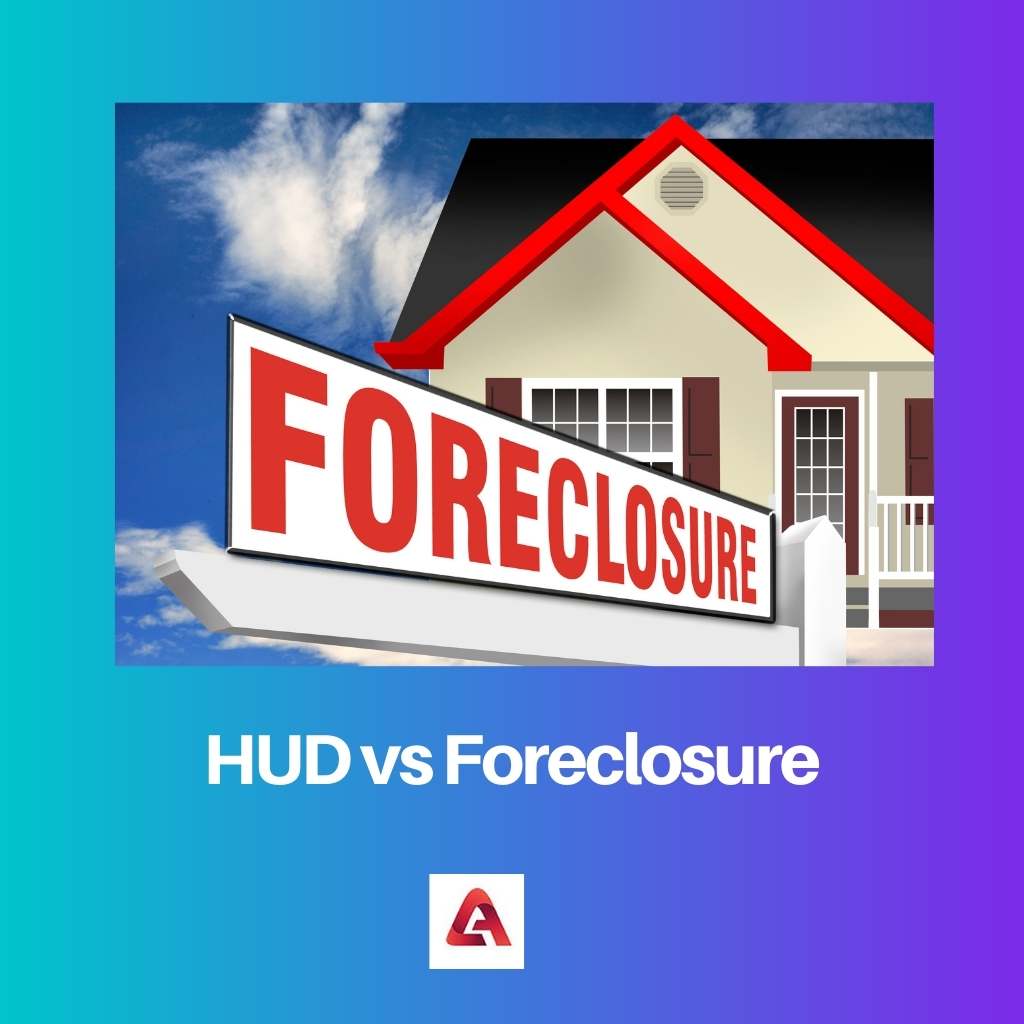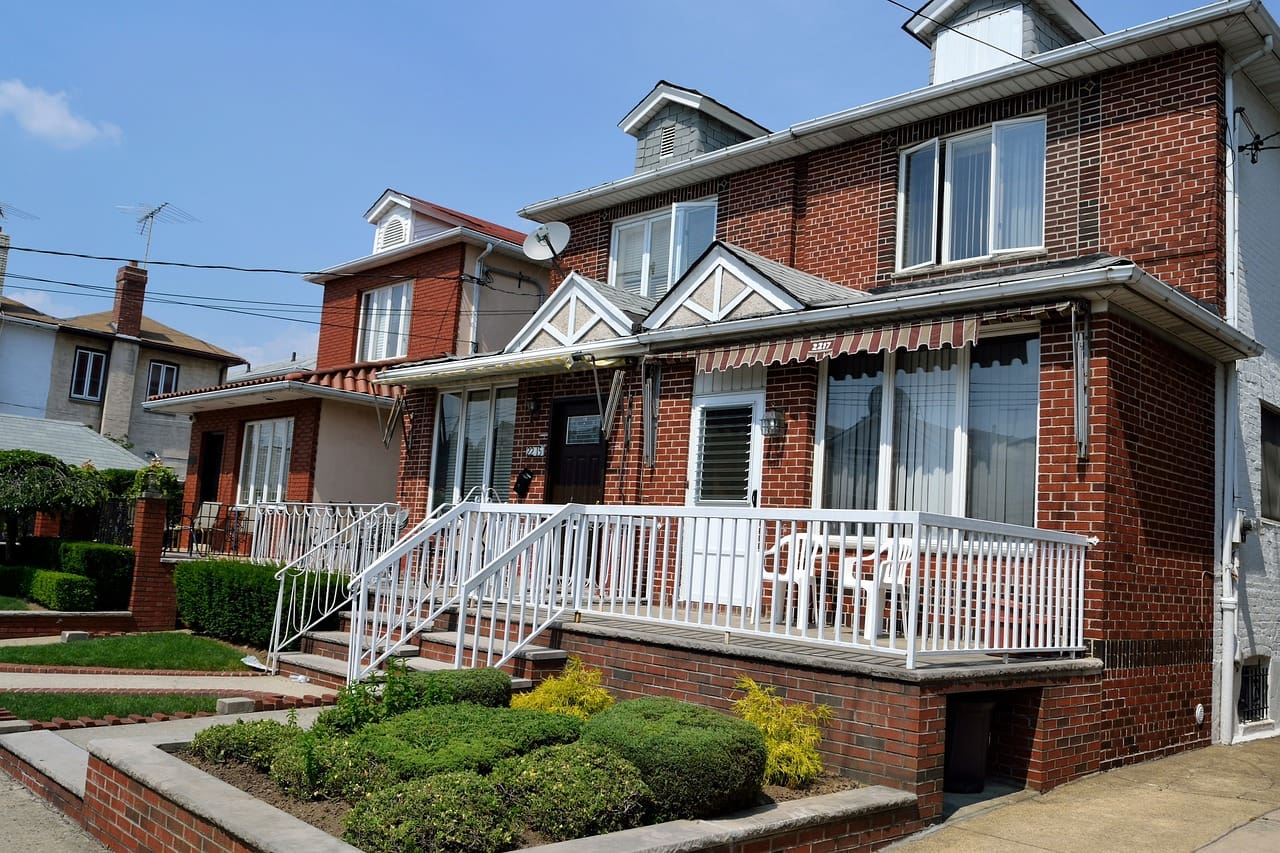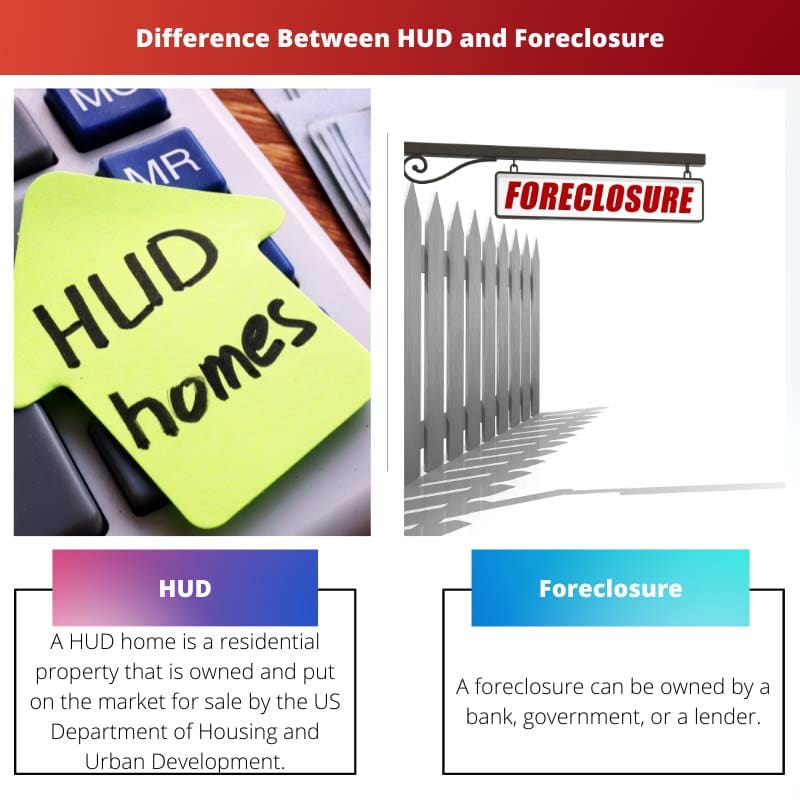HUD homes and foreclosed properties are similar in many ways, but at the same time, ownership and the procedure of buying and selling are different.
When a person cannot pay the monthly mortgage, it becomes a foreclosed property and directly goes under the organization that lends the money during the purchase. HUD homes are one type of foreclosed property.
Key Takeaways
- HUD is a government agency that oversees housing and urban development, while foreclosure is a legal process that allows lenders to take back property for unpaid loans.
- HUD provides housing assistance programs, while foreclosure can result in the loss of a home.
- HUD helps low-income families, while foreclosure can affect anyone with a mortgage.
HUD vs Foreclosure
HUD provides programs and services to assist low-income families, elderly individuals, and people with disabilities in accessing safe and affordable housing. Foreclosure is a legal process in which a lender takes possession of a property from a borrower who defaults on their mortgage. It can have serious consequences for borrowers.

HUD homes are excellent alternatives to buying normal residential properties, especially for people with low credit scores. But, HUD homes’ entire selling and buying process is a bit more complicated than conventional real estate.
HUD homes are purchased on FDA loans and can be authing from single-room apartments to big houses.
Foreclosure properties are easy to find nowadays, and the selling and buying process is comparatively less complicated than HUD homes.
Low prices of foreclosure properties attract customers, but foreclosures are found in poor conditions.
Comparison Table
| Parameters of Comparison | HUD | Foreclosure |
|---|---|---|
| Definition | A HUD home is a residential property that is owned and put on the market for sale by the US Department of Housing and Urban Development. | One can buy a foreclosed property with a mortgage, which is very common. |
| Order | HUD homes are a subset of foreclosure properties. | Foreclosure properties are not part of HUD homes. |
| Finding Property | For finding HUD homes, one needs information like zip code, address, city, state, country, etc. | Details of foreclosures can be found on the websites of banks and lenders. The realtor of an area can also help. |
| Loans | HUD homes are foreclosed properties bought using FHA (Federal Housing Administration) loans. | A person cannot make an offer directly for purchasing a HUD home and can only do so with the help of a real estate agent. |
| Purchase | Foreclosed properties are sold through auctions, short sales, directly from lenders, governments, etc. | To find HUD homes, one needs information like zip code, address, city, state, country, etc. |
| Selling | HUD homes are sold through an online bidding system where each property has a definite deadline. | A person can make an offer to buy a foreclosed property. |
What is HUD?
HUD homes are owned and put on sale by the Department of Housing and Urban Development (HUD). Since HUD homes are purchased on FDA loans, in case of any defaulters, they immediately come under the possession of HUD.
One can visit the HUDHomes website to search HUD properties in several areas. The agents’ contact details are also mentioned because HUD homes cannot be bought by making direct offers to the seller.
When someone decides to buy a HUD home, the down payment depends on the person’s credit score. For example, a person who has a credit score below 580 needs to make a down payment of 10% and with a credit score above 580, the percentage decreases.
The HUD home has to be FHA-insured to avail of an FDA loan. Otherwise, one might have to look for alternatives.
A buyer has to make the HUD home he/she is purchasing the primary residence. Also, a buyer cannot purchase a HUD home if he/she has already bought one in the past two years.
Another condition is that after purchasing, the person/family has to stay in the new home for at least a year.

What is Foreclosure?
There are various ways to find foreclosed properties, as the lists are available on bank websites, newspapers, periodicals, multiple-listing services (MLS), etc.
One can also approach a real estate agent for help, as many lenders sell their properties through them. Banks, lenders, or even governments mainly own foreclosed property. There are five types of foreclosures. They are mentioned below.
- Pre-foreclosures: When a lender attempts to sell a property before it is offered for sale at auction.
- Short sales: A situation where a lender willingly accepts less for the given property than what is owed on the mortgage.
- Sheriff’s sale auction: When a lender allows the buyer more time to catch up on the mortgage payments.
- Bank-owned properties: When properties are not sold at the action and become real estate-owned properties.
- Government-owned properties: Some properties can be purchased on loans guaranteed by the federal government.
One of the most important things to do before buying a foreclosure is to examine the property’s condition. Most of the time, the house is found in poor condition because people who know they will lose ownership stop maintaining the property.
So, looking at the property’s condition is better for assessing its correct market value.

Main Differences Between HUD and Foreclosure
- A HUD home is a residential property that is owned and put on the market for sale by the US Department of Housing and Urban Development. In contrast, a foreclosure is mainly owned by the lender who lends money to a family to buy the house.
- All HUD homes are a subset of foreclosures but not vice versa.
- To find HUD homes, one needs information like zip code, address, city, state, country, etc., to check on their official website. On the other hand, one can check the bank websites for foreclosure details or contact the realtor in that area.
- HUD homes are bought using FHA (Federal Housing Administration) loans, whereas foreclosed property can be purchased with a mortgage, which is very common.
- A person cannot make an offer directly for purchasing a HUD home and can only do so with the help of a real estate agent, whereas a person can make an offer himself for buying a foreclosed property.
- HUD homes are sold through an online bidding system where each property has a definite deadline. In contrast, foreclosed properties are sold through auctions, short sales, directly from lenders, governments, etc.

- https://digitalcommons.calpoly.edu/cmsp/503/
- https://www.bostonfed.org/-/media/Documents/Community%20Development%20Issue%20Briefs/cdbrief4-52020.pdf

As a real estate agent, I found this article quite useful and well-researched. Thank you for sharing this valuable information.
This is a great resource for anyone who’s considering purchasing a home and wants to understand the differences between HUD and foreclosures. Well done!
A very thorough and detailed explanation of the differences between HUD and Foreclosure – fantastic work!
This article is very informative and useful for those who want to learn more about HUD homes and foreclosures.
I don’t believe the comparison of HUD homes and foreclosure processes is accurate, this article does not provide enough clarity.
I thought I knew quite a bit about the housing market, but I learned a lot from reading this article. It is well-explained and addresses important differences between HUD homes and foreclosure.